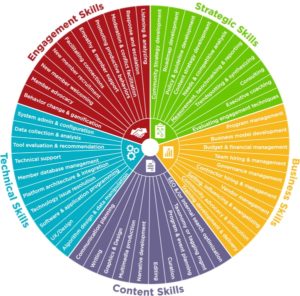By Ted McEnroe, Head of Research, The Community Roundtable
What do you say when you’re asked to describe what you do as a community professional? I’m betting it’s not an easy question to answer – particularly when it comes from Aunt Betty at the Thanksgiving table. What about when you try to explain how overwhelmed you are to your manager – or your HR department?
Without a frame of reference, it is all to easy to struggle with explaining what you can and cannot accomplish given your skills, experience and time limitations.
We’ve also found that community job descriptions can be all over the map – often expecting one person to address a huge range of diverse responsibilities.
Our mission at The Community Roundtable is to listen, synthesize and distill the practice of community management in a way that is easy to understand and communicate. We do this through our models and research. Last year, we published our first iteration of the Community Skills Framework as well as part of the Community Manager Salary Survey 2014 – and we learned a lot in the process.
This year, we’ve evolved both the research and the framework and have recently launched the Community Careers and Compensation 2015 survey, which is now open.
The updated Community Skills Framework includes five skill families with ten skills in each family, prioritized based on what we learned from our 2014 research.

A draft of the Community Skills Framework in the Community Careers and Compensation survey
How Does This Help You?
First, when Aunt Betty asks you what community management is you can say, “It’s a mix of engagement, content, technical, business and strategy responsibilities.” This may or may not mean anything to her but it adds enough detail about your job without being verbose – and in plain language.
Second, and more importantly, it frames the conversation with your stakeholders about the scope of your role, its priorities, what is reasonable for one person to do and where your strengths and weaknesses are… incredibly helpful as you look to navigate your career and where you want to head next.
At The Community Roundtable, we use the Community Skills Framework to:
- Scope our research and report on what skills are priorities for different community roles (moderation, specialist, manager, strategist and director roles).
- Identify and report on those skills seen as consistent blind spots – areas where community professionals need the most training and resources.
- Prioritize programming in TheCR Network, identify where training would be valuable and determine areas to dig deeper on with our research.
If you’re a community professional, we hope the survey sparks ideas and gives you a better understanding of your own strengths and weaknesses.
